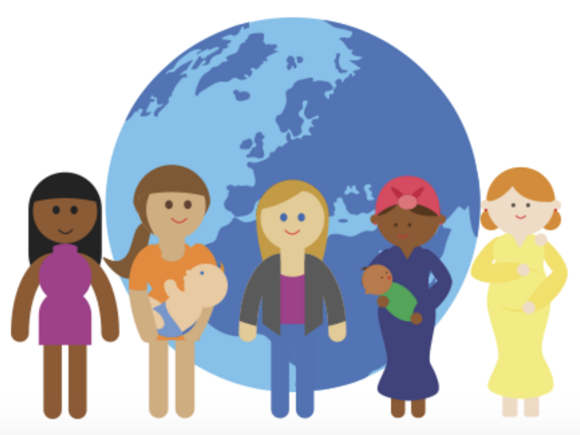¡Más del 80% de los recién nacidos en todo el mundo son amamantados durante el primer mes!
Sabías…? En todo el mundo, las tasas de lactancia materna están aumentando. La mayoría de los bebés recién nacidos reciben leche materna durante su primer mes, el mejor comienzo nutricional en la vida. En muchos países, en comparación con hace 15 años, ahora más madres amamantan exclusivamente a sus bebés hasta los seis meses.
Sin embargo, en general, muy pocos bebés son amamantados exclusivamente. Solo el 43% de los bebés se benefician de la lactancia materna exclusiva hasta los seis meses. La lactancia materna funciona mejor cuando se amamanta a los bebés dentro de la primera hora después de nacer y se les da solo leche materna hasta los seis meses de edad.
En algunas culturas, el calostro se tira y los recién nacidos reciben agua azucarada y otros alimentos y bebidas durante los primeros meses. Estas prácticas de alimentación interfieren con la lactancia. También ponen a los bebés en mayor riesgo de enfermedad y desnutrición.
Los beneficios de la lactancia materna exclusiva incluyen un crecimiento saludable, una inmunidad mejorada y un mejor rendimiento académico. La lactancia materna exclusiva también se ha relacionado con un menor riesgo de obesidad, alergias e infecciones. La lactancia materna puede salvar más de 800.000 vidas cada año, ya que las madres amamantan a sus bebés exclusivamente desde el nacimiento.

Fuentes
Victora CG, Bahl R, Barrios AJ et al. Lancet Breastfeeding Series Group. Breastfeeding in the 21st century: epidemiology, mechanisms, and lifelong effect. Lancet 2016; 387(10017):475-90.
http://data.unicef.org/topic/nutrition/infant-and-young-child-feeding/# (Accessed December 29 2016)
UNICEF 2016 From the first hour of life Key findings report. Full report at: <uni.cf/iycfreport2016>
Khan J, Vesel L, Bahl R et al. Timing of breastfeeding initiation and exclusivity of breastfeeding during the first month of life: Effects on neonatal mortality and morbidity – A systematic review and meta-analysis. Matern Child Health J 2015; 19(3):468–79. doi: 10.1007/s10995-014-1526-8
http://data.unicef.org/wp-content/uploads/2016/10/From-the-first-hour-key-findings2016-for-web.pdf (Accessed December 29 2016)
Victora CG, Bahl R, Barrios AJ et al. Lancet Breastfeeding Series Group. Breastfeeding in the 21st century: epidemiology, mechanisms, and lifelong effect. Lancet 2016; 387(10017):475-90.
Black RE, Victor CG, Walker SP et al. Maternal and Child Nutrition Study Group. Maternal and child undernutrition and overweight in low-income and middle-income countries. Lancet 2013; 382(9890):427-51.
World Health Organization (WHO). World Health Statistics 2011. Available at: HYPERLINK "http://www.who.int/whosis/whostat/EN_WHS2011_Full.pdf?ua=1"
http://www.who.int/whosis/whostat/EN_WHS2011_Full.pdf?ua=1 (Accessed December 29 2016)
http://data.unicef.org/topic/nutrition/infant-and-young-child-feeding/# (Accessed December 29 2016)
UNICEF 2016 From the first hour of life Key findings report. Full report at: <uni.cf/iycfreport2016>
Cai S, Pang WW, Low YL et al. Infant feeding effects on early neurocognitive development in Asian children. Am J Clin Nutr 2015; 101(2):326–36.
Belfort MB, Rifas-Shiman SL, Kleinman KP et al. Infant feeding and childhood cognition at ages 3 and 7 years: Effects of breastfeeding duration and exclusivity. JAMA Pediatr 2013; 167(9):836–44.
Lawrence R, Lawrence R. (2011) Breastfeeding: Guide for the Medical Professional. 7th ed: Mosby.
Tharner A, Luijk MP, Raat H et al. Breastfeeding and its relation to maternal sensitivity and infant attachment. J Dev Behav Pediatr 2012; 33(5):396–404.
Victora CG, Barros FC, Horta BL et al. Breastfeeding and school achievement in Brazilian adolescents. Acta Paediatr 2005; 94(11):1656–60.
World Health Organization Infant and young child feeding for health professionals. 2009.
Agostoni C, Braegger C, Decsi T et al. Breast-feeding: A commentary by the ESPGHAN Committee on Nutrition. J Pediatr Gastroenterol Nutr 2009; 49(1):112–25.
Duijts L, Jaddoe VW, Hofman A et al. Prolonged and exclusive breastfeeding reduces the risk of infectious diseases in infancy. Pediatrics 2010; 126(1):e18–25.
Horta B, Victora C. Long-term effects of breastfeeding. A systematic review. WHO 2013. Available at: http://apps.who.int/iris/bitstream/10665/79198/1/9789241505307_eng.pdf (accessed 20 November 2014).
Lamberti LM, Fischer Walker CL, Noiman A et al. Breastfeeding and the risk for diarrhea morbidity and mortality. BMC Public Health 2011; 11 Suppl 3:S15.
Lawrence R, Lawrence R. (2011) Breastfeeding: Guide for the Medical Professional. 7th ed: Mosby.
World Health Organization Infant and young child feeding for health professionals. 2009
Save the Children. Superfood for babies: How overcoming barriers to breastfeeding will save children’s lives (2013).
Last revised: February, 2017
Únete a
Tranquilidad en la crianza a un sólo clic. Forma parte de Nestlé Baby and Me y recibe increíbles beneficios para ti y tu bebé.
HERRAMIENTAS
En Baby & Me te proveemos las mejores herramientas para el cuidado de tu bebé desde antes, durante y después del embarazo.
PROGRAMA DE NUTRICIÓN
Nuestro programa te proporciona el conocimiento, la asesoría práctica y las destrezas que te ayudarán a tomar decisiones correctas en cuanto a nutrición y alimentación para tu hijo.
EXPERTOS EN NUTRICIÓN 24/7
Contacta a nuestros expertos para resolver tus principales dudas sobre nutrición
Club de beneficios
Descuentos y contenidos exclusivos que el Club de beneficios de Nestlé Baby&me tiene preparados para ti. Te invitamos a descubrir todas las marcas asociadas.

